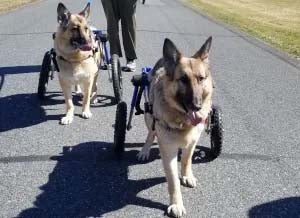German Shepherds are known for their intelligence, loyalty, and versatility, and understanding how long they live is crucial for providing the best care. The typical lifespan of a German Shepherd ranges from 9 to 13 years, and at HOW.EDU.VN, we can connect you with expert veterinary professionals who offer personalized strategies to extend your dog’s life expectancy. By focusing on preventative care, proper nutrition, and a proactive approach to health issues, you can significantly enhance your German Shepherd’s well-being and longevity with the proper canine healthcare and responsible pet ownership.
1. Understanding the Average Lifespan of German Shepherds
The average lifespan of a German Shepherd is typically between 9 and 13 years. This range is influenced by a variety of factors including genetics, diet, exercise, and overall health management. Just as human lifespans vary, so too do those of German Shepherds, with some living shorter lives due to health complications or accidents, while others thrive well beyond their average expectancy thanks to optimal care.
1.1. Factors Influencing German Shepherd Lifespan
Several factors can significantly affect how long a German Shepherd lives:
- Genetics: Just like humans, genetic predispositions play a significant role in a dog’s health and lifespan. Some German Shepherds are genetically predisposed to certain health conditions that can shorten their lives.
- Diet: A balanced and nutritious diet is essential for maintaining a healthy weight and supporting overall health. Overfeeding or feeding low-quality food can lead to obesity and related health problems.
- Exercise: Regular physical activity helps keep German Shepherds fit and reduces the risk of obesity, cardiovascular issues, and joint problems.
- Preventative Care: Regular veterinary check-ups, vaccinations, and parasite control are crucial for detecting and preventing diseases.
- Living Conditions: A safe and clean environment is important for preventing infections and injuries.
- Mental Health: Mental stimulation and social interaction contribute to a dog’s overall well-being and can help prevent stress-related health issues.
1.2. Common Health Issues Affecting Lifespan
German Shepherds are prone to certain health issues that can impact their lifespan. Here are some of the most common:
- Hip and Elbow Dysplasia: These are hereditary conditions where the hip or elbow joint doesn’t develop properly, leading to arthritis and pain.
- Degenerative Myelopathy (DM): A progressive spinal cord disease that causes hind limb weakness and paralysis.
- Bloat (Gastric Dilatation-Volvulus): A life-threatening condition where the stomach fills with gas and twists.
- Cardiac Issues: German Shepherds can be prone to heart conditions like dilated cardiomyopathy (DCM).
- Cancer: Various forms of cancer, such as osteosarcoma (bone cancer) and lymphoma, can affect German Shepherds.
- Pancreatic Issues: German Shepherds are also susceptible to exocrine pancreatic insufficiency.
- Epilepsy: Some German Shepherds may develop epilepsy, leading to seizures.
- Arthritis: As German Shepherds age, they are prone to arthritis.
1.3. The Role of Genetics in Longevity
Genetics play a pivotal role in determining a German Shepherd’s lifespan. Responsible breeders focus on minimizing hereditary health issues to improve the longevity and quality of life for their dogs. Understanding your dog’s lineage and any potential genetic predispositions is essential for proactive health management. At HOW.EDU.VN, our network of veterinary experts can help you interpret genetic testing results and develop a tailored health plan for your German Shepherd.
2. Optimizing Diet and Nutrition for a Longer Life
A proper diet is fundamental to extending the lifespan of a German Shepherd. Ensuring they receive balanced nutrition tailored to their age, activity level, and health condition is crucial for maintaining their overall well-being.
2.1. Key Nutritional Requirements
German Shepherds require a diet rich in high-quality protein, healthy fats, and essential vitamins and minerals. Protein supports muscle development and repair, while fats provide energy and support brain function. Vitamins and minerals are essential for various bodily functions, including immune system support and bone health.
2.2. The Importance of a Balanced Diet
A balanced diet helps maintain a healthy weight, supports organ function, and boosts the immune system. Avoid overfeeding, which can lead to obesity and associated health issues such as diabetes and joint problems.
2.3. Avoiding Harmful Foods
Certain foods are toxic to dogs and should be avoided at all costs. These include chocolate, grapes, raisins, onions, garlic, and foods containing xylitol. Ensure your German Shepherd has no access to these substances.
2.4. Supplementation and Special Diets
Depending on your German Shepherd’s age and health condition, supplementation may be beneficial. For example, glucosamine and chondroitin can support joint health, while omega-3 fatty acids can improve skin and coat health. Consult with a veterinarian at HOW.EDU.VN to determine if your dog needs any specific supplements or dietary modifications.
2.5. Feeding Schedules and Portion Control
Establishing a consistent feeding schedule and practicing portion control are essential for maintaining a healthy weight. Divide your dog’s daily food allowance into two or three meals to prevent overeating and reduce the risk of bloat.
3. The Benefits of Regular Exercise
Regular exercise is vital for the physical and mental well-being of German Shepherds. It helps maintain a healthy weight, strengthens muscles and bones, and provides mental stimulation.
3.1. Recommended Exercise Levels
German Shepherds are active dogs that require at least two hours of exercise daily. This can include walks, runs, hikes, and play sessions. Adjust the intensity and duration of exercise based on your dog’s age, health, and fitness level.
3.2. Types of Exercise Suitable for German Shepherds
Variety is key to keeping your German Shepherd engaged and motivated. Here are some suitable exercise options:
- Walking and Running: Daily walks and runs are great for cardiovascular health and muscle conditioning.
- Fetch: Playing fetch is a fun way to burn energy and improve coordination.
- Agility Training: Agility courses provide mental and physical challenges.
- Swimming: Swimming is a low-impact exercise that’s gentle on the joints.
- Herding Activities: Engaging in herding activities can tap into their natural instincts.
- Dog Parks: If your dog is social, a dog park is a great option for them.
3.3. Adapting Exercise to Age and Health Conditions
As German Shepherds age, their exercise needs may change. Senior dogs may require shorter, less intense exercise sessions. If your dog has joint problems or other health conditions, consult with a veterinarian at HOW.EDU.VN to develop an appropriate exercise plan.
3.4. Mental Stimulation Through Exercise
Exercise isn’t just about physical activity; it also provides mental stimulation. Incorporate training exercises, puzzle toys, and interactive games into your dog’s routine to keep their mind sharp.
4. Preventative Veterinary Care: A Key to Longevity
Regular veterinary check-ups are essential for detecting and preventing health problems in German Shepherds. Preventative care can help identify issues early, allowing for timely intervention and improved outcomes.
4.1. Importance of Annual Check-ups
Annual check-ups allow your veterinarian to assess your dog’s overall health, screen for diseases, and provide necessary vaccinations and parasite control. These check-ups are crucial for maintaining your dog’s health and preventing serious illnesses.
4.2. Vaccinations and Parasite Control
Vaccinations protect your German Shepherd from potentially fatal diseases such as rabies, distemper, and parvovirus. Parasite control is essential for preventing heartworm, fleas, ticks, and intestinal parasites.
4.3. Dental Care and Its Impact on Lifespan
Dental health is often overlooked but can significantly impact a dog’s lifespan. Periodontal disease can lead to tooth loss and systemic infections that affect the heart, kidneys, and liver. Regular teeth brushing and professional dental cleanings are essential for maintaining good oral health.
4.4. Early Detection of Health Issues
Early detection of health issues is critical for effective treatment. Be vigilant about monitoring your dog for any signs of illness, such as changes in appetite, weight loss, lethargy, or lameness. If you notice anything unusual, consult with a veterinarian promptly.
5. Managing Common Health Issues in German Shepherds
German Shepherds are prone to certain health conditions that can impact their lifespan. Understanding these conditions and how to manage them is essential for providing the best possible care.
5.1. Hip and Elbow Dysplasia: Management and Treatment
Hip and elbow dysplasia are common in German Shepherds and can lead to arthritis and pain. Management strategies include:
- Weight Management: Maintaining a healthy weight reduces stress on the joints.
- Exercise Modification: Avoiding high-impact activities and opting for low-impact exercises like swimming.
- Medications: Pain relievers and anti-inflammatory drugs can help manage pain and inflammation.
- Physical Therapy: Physical therapy can improve joint function and mobility.
- Surgery: In severe cases, surgery may be necessary to correct joint abnormalities.
5.2. Degenerative Myelopathy (DM): Supportive Care
Degenerative Myelopathy is a progressive spinal cord disease that causes hind limb weakness and paralysis. While there is no cure for DM, supportive care can improve quality of life:
- Physical Therapy: Regular physical therapy can help maintain muscle strength and mobility.
- Assistive Devices: Dog wheelchairs can help dogs with DM maintain mobility and independence.
- Comfort Care: Providing a comfortable and supportive environment is essential.
5.3. Bloat (Gastric Dilatation-Volvulus): Prevention and Emergency Care
Bloat is a life-threatening condition that requires immediate veterinary attention. Prevention strategies include:
- Feeding Multiple Small Meals: Divide your dog’s daily food allowance into several small meals.
- Avoiding Exercise After Eating: Wait at least one hour after eating before exercising.
- Using a Slow Feeder Bowl: Slow feeder bowls can help prevent rapid eating.
- Prophylactic Gastropexy: In high-risk dogs, a prophylactic gastropexy (surgical tacking of the stomach to the abdominal wall) can prevent the stomach from twisting.
5.4. Cardiac Issues: Monitoring and Medication
Cardiac issues such as dilated cardiomyopathy (DCM) can affect German Shepherds. Regular monitoring and medication can help manage these conditions.
5.5. Cancer: Treatment Options and Palliative Care
Various forms of cancer can affect German Shepherds. Treatment options may include surgery, chemotherapy, and radiation therapy. Palliative care can improve quality of life for dogs with cancer.
5.6. Pancreatic Issues: Management and Diet
German Shepherds are also susceptible to exocrine pancreatic insufficiency. You can manage this with diet and medication.
5.7. Epilepsy: Medication and Monitoring
Some German Shepherds may develop epilepsy, leading to seizures. Monitor your German Shepherd and take them to a vet at HOW.EDU.VN for treatment.
6. The Importance of Mental Well-being
A dog’s mental health is just as important as their physical health. Mental stimulation, social interaction, and a positive environment can significantly impact their overall well-being and lifespan.
6.1. Providing Mental Stimulation
German Shepherds are intelligent dogs that require plenty of mental stimulation. Provide them with puzzle toys, training exercises, and interactive games to keep their minds sharp.
6.2. Social Interaction and Companionship
Social interaction is essential for preventing boredom and loneliness. Provide your German Shepherd with opportunities to interact with other dogs and people.
6.3. Creating a Positive Environment
A positive and stress-free environment can improve your dog’s overall well-being. Provide them with a comfortable bed, plenty of toys, and a safe and secure home.
6.4. Recognizing and Addressing Stress and Anxiety
Stress and anxiety can negatively impact a dog’s health. Recognize the signs of stress, such as excessive barking, pacing, and destructive behavior, and take steps to address the underlying causes.
7. Spaying or Neutering: Impact on Lifespan
Spaying or neutering can have a significant impact on a German Shepherd’s lifespan and overall health.
7.1. Health Benefits of Spaying/Neutering
Spaying or neutering can reduce the risk of certain types of cancer and other health problems. Spaying eliminates the risk of uterine infections and tumors, while neutering eliminates the risk of testicular cancer.
7.2. Optimal Timing for Spaying/Neutering
The optimal timing for spaying or neutering can vary depending on the dog’s breed, size, and health. Consult with a veterinarian at HOW.EDU.VN to determine the best time to spay or neuter your German Shepherd.
7.3. Potential Risks and Considerations
While spaying or neutering has many health benefits, there are also potential risks to consider. Early spaying or neutering has been linked to an increased risk of joint disorders and certain types of cancer.
8. Monitoring and Adapting to Senior Dog Needs
As German Shepherds age, their needs change. Monitoring their health and adapting to their changing needs is essential for providing the best possible care.
8.1. Recognizing Signs of Aging
Be aware of the signs of aging in German Shepherds, such as graying hair, decreased energy levels, stiff joints, and changes in appetite.
8.2. Adjusting Diet and Exercise
As your German Shepherd ages, you may need to adjust their diet and exercise routine. Senior dogs may require fewer calories and less intense exercise.
8.3. Providing Comfort and Support
Provide your senior German Shepherd with a comfortable bed, plenty of rest, and extra support for their joints.
8.4. Managing Age-Related Health Issues
Senior German Shepherds are more prone to certain health issues, such as arthritis, kidney disease, and cognitive dysfunction. Work with a veterinarian at HOW.EDU.VN to manage these conditions and improve your dog’s quality of life.
9. The Role of Responsible Breeding
Responsible breeding practices play a crucial role in improving the health and longevity of German Shepherds.
9.1. Importance of Health Screening
Responsible breeders screen their breeding dogs for hereditary health conditions such as hip and elbow dysplasia, degenerative myelopathy, and cardiac issues.
9.2. Choosing a Reputable Breeder
When choosing a German Shepherd puppy, select a reputable breeder who prioritizes health and temperament.
9.3. Understanding Genetic Predispositions
Understanding your dog’s genetic predispositions can help you provide proactive health management and potentially extend their lifespan.
10. Creating a Supportive and Loving Environment
Providing a supportive and loving environment is essential for the well-being of any dog, including German Shepherds.
10.1. The Power of Love and Affection
Love and affection can have a profound impact on a dog’s health and happiness. Spend quality time with your German Shepherd, providing them with plenty of attention and affection.
10.2. Building a Strong Bond
Building a strong bond with your German Shepherd can improve their overall well-being and strengthen your relationship.
10.3. The Impact of a Stress-Free Home
A stress-free home environment can improve your dog’s health and reduce the risk of stress-related health issues.
11. German Shepherd Life Expectancy Chart
Here is a general guideline for German Shepherd life expectancy based on age.
| Age (Years) | Stage | Health Focus |
|---|---|---|
| 0-2 | Puppy/Young Adult | Vaccination, socialization, nutrition |
| 2-7 | Prime Adult | Regular exercise, balanced diet, annual check-ups |
| 7-10 | Mature Adult | Monitoring for age-related issues, adjusting exercise |
| 10+ | Senior | Comfort care, managing health issues, supportive environment |



12. The Benefits of Consulting with Experts at HOW.EDU.VN
Navigating the complexities of German Shepherd health and longevity can be challenging. Consulting with the experts at HOW.EDU.VN provides access to personalized guidance and support.
12.1. Access to Veterinary Specialists
HOW.EDU.VN connects you with top veterinary specialists who can provide expert advice on all aspects of German Shepherd care.
12.2. Personalized Health Plans
Our experts can help you develop a personalized health plan tailored to your dog’s specific needs and health conditions.
12.3. Proactive Health Management Strategies
By working with the experts at HOW.EDU.VN, you can implement proactive health management strategies to potentially extend your German Shepherd’s lifespan.
Conclusion:
While the average lifespan of a German Shepherd is 9 to 13 years, proactive and informed care can significantly impact their longevity and quality of life. By focusing on proper nutrition, regular exercise, preventative veterinary care, mental well-being, and responsible breeding practices, you can help your German Shepherd live a longer, healthier, and happier life.
Do you have questions about your German Shepherd’s health or want to develop a personalized care plan? Contact the experts at HOW.EDU.VN today. Our team of renowned PhDs is here to provide you with the expert guidance you need to help your beloved companion thrive. Reach out to us at 456 Expertise Plaza, Consult City, CA 90210, United States, or give us a call at Whatsapp: +1 (310) 555-1212. You can also visit our website at HOW.EDU.VN for more information. Let us help you give your German Shepherd the best possible life.
Frequently Asked Questions (FAQ)
1. What is the average lifespan of a German Shepherd?
The average lifespan of a German Shepherd is typically between 9 and 13 years.
2. What are the main factors that influence a German Shepherd’s lifespan?
Factors include genetics, diet, exercise, preventative care, living conditions, and mental health.
3. How can I improve my German Shepherd’s diet to help them live longer?
Feed a high-quality, balanced diet appropriate for their age and activity level, avoid overfeeding, and ensure they have no access to toxic foods.
4. How much exercise does a German Shepherd need?
German Shepherds require at least two hours of exercise daily, including walks, runs, and play sessions.
5. Why are regular veterinary check-ups important for German Shepherds?
Regular check-ups help detect and prevent health problems early, allowing for timely intervention and improved outcomes.
6. What are some common health issues that affect German Shepherds?
Common issues include hip and elbow dysplasia, degenerative myelopathy, bloat, cardiac issues, and cancer.
7. Does spaying or neutering affect a German Shepherd’s lifespan?
Yes, spaying or neutering can reduce the risk of certain types of cancer and other health problems, potentially increasing lifespan.
8. How can I provide mental stimulation for my German Shepherd?
Provide puzzle toys, training exercises, and interactive games to keep their minds sharp.
9. What should I do if my German Shepherd shows signs of aging?
Adjust their diet and exercise routine, provide a comfortable environment, and manage any age-related health issues with veterinary care.
10. How can HOW.EDU.VN help me care for my German Shepherd?
how.edu.vn connects you with top veterinary specialists who can provide expert advice, personalized health plans, and proactive health management strategies to help your German Shepherd live a longer, healthier life.